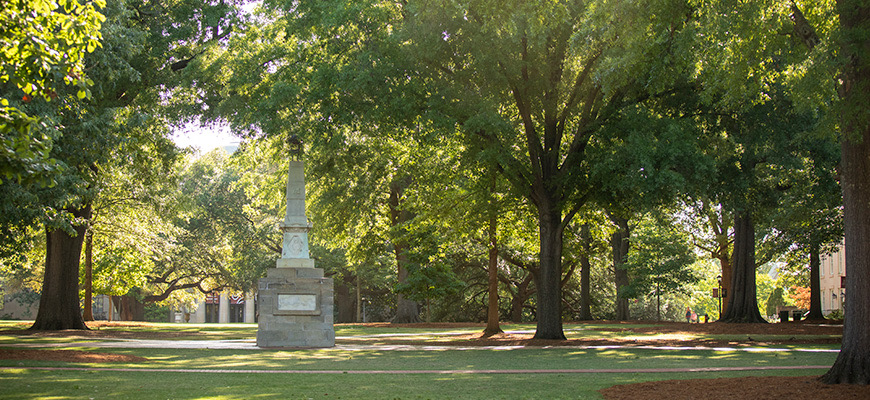
UofSC approves 2018-19 budget
Tuition growth rate slowest in 2 decades
Posted on: July 11, 2018; Updated on: July 11, 2018
By Wes Hickman, whickman@mailbox.sc.edu, 803-777-7440
The University of South Carolina’s Board of Trustees on Wednesday (July 11) approved a systemwide budget for 2018-19 that will slow tuition growth to 2.9 percent or less on most campuses — the lowest increase since 1998. The $1.6 billion plan supports a variety of academic enhancements, technology upgrades and initiatives to increase access across the state. The new budget also reduces the cost for students on Palmetto College campuses that have accumulated more than 75 hours toward a bachelor's degree, helping to ensure that the USC System is the most affordable pathway to a bachelor’s degree in the state.
Projects funded under the 2018-19 budget plan include:
- Continuation of an initiative to bolster teaching and research in key disciplines at the Columbia campus through targeted investment, particularly programs that are in high-demand, high-employability sectors in South Carolina;
- Upgrades and security enhancements to the university’s IT network;
- Targeted investments in law enforcement and safety initiatives;
- Enhanced and expanded programs at Palmetto College campuses throughout the state and online, helping more South Carolinians earn bachelor’s degrees — including the initial phases of the Palmetto Pathway program in Columbia, which will aim to provide a low-cost entry to a bachelor’s degree at approximately $7,000 per year.
Carolina already is ranked among the most efficient universities in the nation and the proposed budget continues to make strategic investments in core functions that promote its academic mission. And while the university receives only about 10 percent of its operating budget from state dollars, a boost in state support this year will help keep tuition in check.
The eight-campus system will receive an increase of more than $8.2 million in recurring funds under the state budget plan approved by the General Assembly last month. That would represent the largest increase in state support in recent years, beginning to reverse a 10-year trend of stagnant funding.
“While there is still work to be done, it’s very encouraging that the leadership in the General Assembly recognizes that additional state investment has a direct and immediate impact on lessening the financial burden on South Carolina families. We look forward to more conversations with lawmakers on ways to ensure college remains affordable and accessible,” said university President Harris Pastides.
One promising path forward is the Higher Education Opportunity Act, a comprehensive bipartisan proposal that both restores funds to state institutions and provides more opportunity for South Carolina students to earn a degree. A U.S. Supreme Court ruling in June paves the way for states to realize new revenue through Internet retail sales. A significant portion of the funds would be dedicated to higher education and would reward schools for holding down tuition and enrolling more South Carolinians.
USC’s system enrollment now tops 51,000 (36,000 at the Columbia campus alone), and the system confers more than 40 percent of the state’s bachelor’s degrees and above. With decades of declining state funding, tuition is the largest source of funding for the university. Nearly half of the students at the Columbia campus do not rely on loans to pay tuition, and those who do graduate with an average debt of $28,972, which is below both the national and state averages. And nearly 90 percent of USC Columbia graduates find employment or enroll in graduate school. Of those who take jobs, the average salary is more than $47,500 — higher than the state’s average for bachelor’s degree holders.
Proposed FY2019 tuition per semester (includes technology fee)
Columbia Campus (2.9 percent)
Undergraduate
Resident: $6,308
Nonresident: $16,649
Graduate
Resident: $7,025
Nonresident: $14,798
Medical School–Columbia and Greenville
Resident: $21,342 (3 percent)
Nonresident: $43,875 (no change)
Law School (2.9 percent)
Resident: $13,304
Nonresident: $25,751
USC Aiken (2.5 percent)
Resident: $5,355
Nonresident: $10,584
USC Beaufort (2.48 percent)
Resident: $5,340
Nonresident: $10,863
USC Upstate (1.5 percent)
Resident: $5,744
Nonresident: $11,495
Palmetto College Campuses (2.9 percent)
Resident: $3,779
Nonresident: $9,119
Palmetto College Online (2.5 percent)
Resident: $5,355
Nonresident: $10,584
Share this Story! Let friends in your social network know what you are reading about